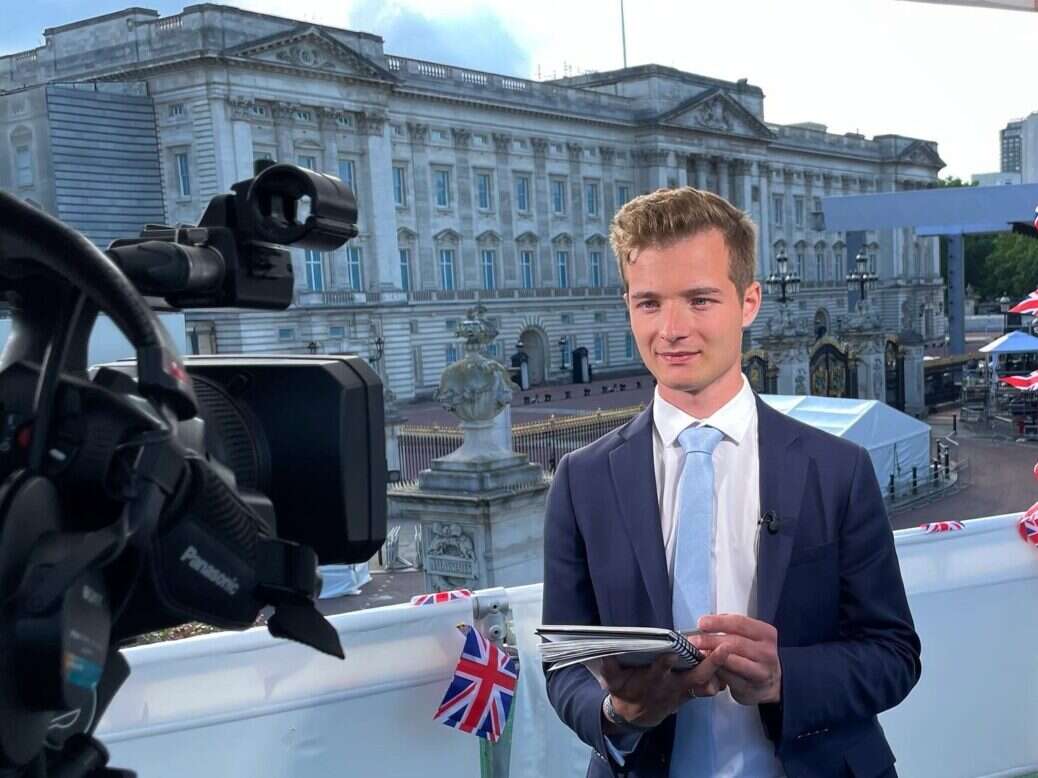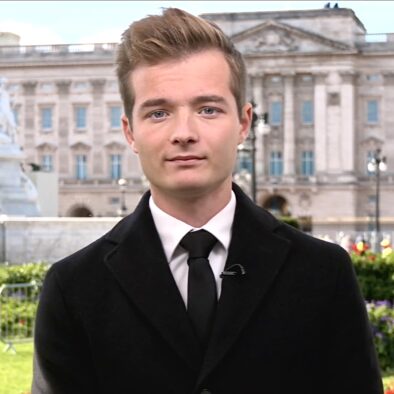
In April, Cameron Walker landed his first TV reporting role – covering the royal family for GB News.
Until then the former ITV News trainee had been working behind the scenes as a producer on the channel.
Yet five months on from his appointment, he was reporting on the death of the Queen alongside some of the country’s most experienced journalists.
Here, the 25-year-old reflects the challenges he faced as he moved centre stage to cover the biggest story he’s likely to work on in his career.
I was at Luton Airport when the news flashed up on passengers’ phones. I’d dashed there from the GB News studios in an attempt to make it in time to Balmoral, where just hours earlier The Queen’s doctors had announced her health was in serious decline.
I’d seen the expressions of senior royals arriving in cars at Balmoral and sensed the situation was very, very bad.
But then it was confirmed, the Queen was dead, and one-by-one the faces of travellers alongside me at the airport dropped as they read the short-flash on their phones. There was silence across the airport. Everyone had somewhere to be, but everyone stood still. Suddenly, everything had changed.
Despite the fact I’d only been covering the royal family for a few months, I immediately felt a huge sense of responsibility. Like all royal reporters this was a story I knew I’d be covering one day, but it still felt shocking that the moment had come. That sense of shock was amplified by the fact that just a few weeks earlier I’d filed report-after-report on the Queen’s Platinum Jubilee which had seen the UK come together to celebrate.
The atmosphere aboard the short flight up to Scotland was sombre. Many people were in tears. Many others fought to keep their composure. After landing and walking through arrivals, I spotted a line of flagpoles flying Scottish Saltires at half-mast and the enormity of the situation really started to sink in.
Preparations to cover the Queen’s passing had been in the planning by palace officials and the Government for decades. And news outlets across the country had been planning for some time too. Striking the right tone was something every newsroom was now placing a huge importance on.
At GB News the Queen and the royal family are a huge part of our viewers’ lives. Covering that Platinum Jubilee underlined to me just how important Her Majesty was to them, and to so many people across Great Britain.
After arriving very late at my hotel in Ballater, a short drive from Balmoral, I barely slept. That big story adrenaline, which all journalists will recognise, made sleep impossible. Instead, there were many questions flying around my head and keeping me awake. Many of them were technical ones like: ‘Would the satellite link to London work?’ and ‘How would we access pooled footage?’.
I was also wondering where was going to be the best place for me to position myself each day to get the very best coverage. But my biggest question was how my coverage – and that of my channel – was going to compete with the established broadcasters, all of which had decades of experience covering events like this.
All other channels have been preparing for “Operation Lion” (the death of a major royal) and “London Bridge” (the Queen’s death) for years. It meant they had their tributes, scripts, plans and graphics in place. But as a new channel, we’d been busily trying to catch up.
I was left wondering: Would we be ready?
‘Huge weight of pressure to deliver’
But behind the scenes, our team had put plans in place which immediately swung into action.
Seconds after Alastair Stewart announced the Queen’s death to our TV and radio viewers we faded the screen to black.
All adverts stopped – and that remained the case until after the Queen’s funeral.
The usual bright blue background we use on screen was replaced with a more sombre, purple, hue.
Across the studio, we had black ties in all the dressing rooms ready for guests and presenters, but it was still a scramble on the day to ensure everybody appeared on screen wearing respectful attire.
At GB News we place great emphasis on being The People’s Channel and put communities at the heart of everything we do. That’s why in the hours after the Queen’s death we quickly made sure our viewers became the central thread through our coverage. It was a great call as it proved to be the very best way to deliver the most fitting tribute to the Queen’s life.
During the period of national mourning, we read out thousands of viewers’ comments on air. Some even appeared via video link to share their memories of the late Queen. We focused on placing our reporting teams in local pubs and community centres – and set about gauging the reaction of people outside the metropolitan bubble. Our political correspondent, Tom Harwood, found a second calling as he enthusiastically chatted to those who’d queued for hours to see the Queen lie-in-state.
There’s no doubt that, for everybody working on the channel, this was the biggest news event we’ve covered since launching 15 months ago. We now attract 2.6 million viewers to our TV coverage every month and our combined audience on TV and radio is bigger than TalkTV’s combined TV and radio audience. So everybody involved in the coverage, from the planners to the tech staff to the presenters felt a huge weight of pressure to deliver great content on TV and radio.
I was also lucky to be working with such experienced colleagues like Eamonn Holmes, Isabel Webster and Anne Diamond. Much of our coverage, including the funeral itself, was anchored by Alastair Stewart. He won’t thank me for saying this, but I watched Alastair on TV when I was growing up. So to receive messages praising the coverage he and I were delivering was truly humbling.

As a young correspondent I feared I might struggle to be taken seriously. I’d worked tirelessly to study the royal family in the short time since I’d been appointed as I knew how important it was to be aware of royal protocol. And I knew that viewers would quickly (and rightly) be on my back if I got any facts incorrect which added to the sense of nervousness I felt at times covering the story.
It was an honour to broadcast with Alastair almost every day, because his serenity in the studio enabled me to focus on what really mattered – which was trying to accurately present the facts about what was going on to a heartbroken United Kingdom. Despite his years of experience, Alastair treated me as an equal which gave me huge confidence as I tried to do my best in reporting on the biggest story of my life.
Sweet-talking police for the ‘perfect view’
Naturally, much of our work at GB News was building up to the day of the funeral. Central London was on lockdown from the early hours and it was obviously very difficult to get in or out, even with my media accreditation.
In the end, I even had to sweet-talk a number of police officers and security guards to let me through barriers so I could access my media position opposite Westminster Abbey’s Great West Door. There, high up on a platform, I had the perfect view as the 2,000 funeral guests began to arrive.
Reporters had monitors inside the symbolically named ‘QEII Centre’ to watch the funeral and GB News screened the service live to viewers. Sat at conference tables, my fellow journalists and I frantically scribbled notes in an attempt to try to remember every detail to recall later during live reports. We all knew we were unlikely to ever be involved in an event like this again in our lives.
I saw it as a privilege to be an eyewitness at the start of the procession of the Queen’s coffin following the funeral. The grand theatre of the scene was enhanced by the flawless choreography from the Armed Forces who escorted the late sovereign through the streets of London.
I recorded my final report by concluding with a quote from the then Princess Elizabeth’s 1947 speech, telling GB News viewers: “She declared that her whole life, whether it be long or short, should be devoted to our service. I think many people would agree that she has done just that.”
Then I stepped away from my job as a reporter. I wanted to take a moment to simply pay my respects as a private citizen, because it was something I’d not had the chance to do at any point since the Queen’s death.
I’d filed my report and for the first time in weeks I decided the story could wait.
Then, as Her Majesty’s coffin pulled out of sight, I bowed my head. I’d done my job, and each second of it had been a privilege, which I’ll never take for granted.
Cameron Walker is GB News’ royal reporter
Email pged@pressgazette.co.uk to point out mistakes, provide story tips or send in a letter for publication on our "Letters Page" blog
